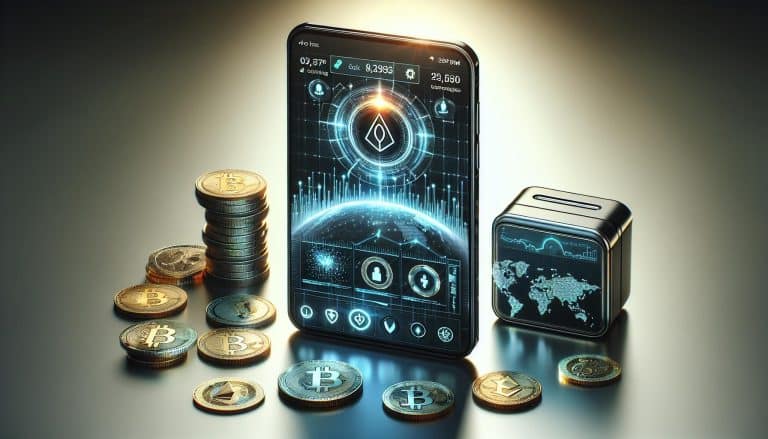Xrp Use Cases
Ripple (XRP) is a cryptocurrency that has become increasingly popular in the digital asset world. It has been used for many purposes, ranging from international payments to gaming and finance. This article will explore the various use cases of XRP, including its potential applications in the real estate, artificial intelligence, internet-of-things, gambling, and education sectors.
XRP is an open source technology created by Ripple Labs which enables fast and cost-effective international payments through a distributed ledger system. Transactions using XRP are settled quickly with low transaction fees compared to those associated with other traditional payment methods. Furthermore, XRP transactions are secure due to their decentralized nature and immutability meaning they cannot be reversed or changed once confirmed on the blockchain network. Consequently, this makes it ideal for use cases where security and speed of settlement are key considerations such as cross border payments. Additionally, XRP can be used as a digital asset exchange medium in order to buy or sell different digital assets quickly without having to convert into fiat currency first. Furthermore its ability to facilitate quick transactions also makes it attractive for use in gaming scenarios such as online casinos or esports tournaments where participants need access to funds quickly.
International Payments
The potential for Ripple’s XRP to revolutionize the international payments market is both ironic and undeniable. XRP is a digital asset that can be used as an intermediary in cross-border payments, allowing for faster and cheaper transactions than traditional methods. By acting as a bridge between two or more currencies, it eliminates the need for currency conversion and thereby reduces transaction costs and delays. This makes it more appealing to banks, allowing them to offer better services to their customers around the world. With its ability to speed up payments, reduce costs, and provide liquidity in real time, XRP has become increasingly popular among financial institutions looking for cost effective solutions when making global payments.
The potential of XRP extends beyond international payments into digital asset exchange as well. As an open source system with low latency processing times, it provides users with a platform where they can easily convert fiat currencies into digital assets such as Bitcoin or Ether with minimal fees. Furthermore, by providing access to multiple exchanges within one platform, users can take advantage of price differences between markets to capitalize on arbitrage opportunities without having to maintain multiple accounts across different exchanges. Consequently, Ripple’s XRP could become an important tool in the world of digital asset exchange and trading going forward.
Digital Asset Exchange
The digital asset exchange is an important part of the cryptocurrency market, allowing traders to buy and sell different digital assets. It serves a dual purpose: reducing counterparty risk while also providing opportunities for trading cryptocurrencies. By connecting buyers and sellers through this platform, users can trust that they are dealing with reputable parties, which provides assurance in their transactions.
Trading Cryptocurrencies
Considering the increasing popularity of cryptocurrency trading, XRP offers a unique range of features that are beneficial for investors. Features such as day trading and margin trading provide traders with increased flexibility when managing their positions in the markets. Additionally, XRP has very low latency performance which is critical for algorithmic traders who require extremely fast transaction speeds while executing their strategies. Furthermore, XRP’s decentralized nature reduces counterparty risk and provides users with an additional layer of security when making transactions.
The use of the XRPL ledger allows users to make secure transfers without having to worry about third-party involvement or relying on centralized services. This makes it easier for investors to exchange assets without worrying about potential issues arising from intermediaries. Moreover, this feature is especially beneficial for cross-border transactions because it eliminates any need to rely on banks or other financial institutions which can often take days or weeks to complete international payments. All these features make XRP an ideal platform for cryptocurrency traders looking to maximize profits and reduce counterparty risk quickly and securely.
Reducing Counterparty Risk
By leveraging the decentralized nature of the XRPL ledger, investors are able to reduce counterparty risk when executing transactions. This is done by ensuring that each party has access to a digital identity and that all payments can be made across borders without having to go through an intermediary. The trustless, distributed nature of XRPL allows for increased security in cross border payments as all transactions are publicly visible on the ledger and have no single point of failure or control. Additionally, with XRPL’s built-in voting system, users can cast their vote for a resolution if a transaction goes wrong so that it can be reversed quickly. This further reduces any potential counterparty risk associated with using cryptocurrencies for trading. These features make XRP an ideal choice for reducing counterparty risk when trading cryptocurrency. By making use of these features, investors can trade with confidence knowing that their assets are safe from malicious actors and other forms of fraud. As such, XRP can be used effectively to reduce counterparty risk while trading cryptocurrency. Transitioning into gaming, this technology could provide gamers with greater security when buying virtual items or participating in online tournaments.
Gaming
Exploring the possibilities of XRP in gaming, its potential to revolutionize the industry is evident. Through the use of virtual currency and improved accessibility, gamers can benefit from both increased security and convenience. This allows for a more secure experience while gaming, as transactions are visible on the blockchain ledger system, ensuring that all payments are traceable and immutable. Furthermore, XRP enables universal access to games regardless of geographical location or currency used; this helps reduce frustration caused by exchange rate fluctuations or fees associated with international payments.
In addition to providing greater security and convenience to players, XRP could also be used as an in-game currency for monetizing gameplay experiences. Players would have incentive to participate by earning rewards within a game environment that are converted into usable digital tokens such as XRP which can then be exchanged for goods or services outside of the game universe. This provides a new avenue for developers seeking alternative revenue streams beyond traditional advertising models. With these advantages in mind, it is clear that XRP has great potential to revolutionize the gaming industry through improved accessibility and enhanced security features.
Finance
The gaming industry has been a notable adopter of cryptocurrency, and the financial sector is following suit. The advantages of using cryptocurrencies for finance go beyond merely acting as an alternative payment method; it also provides opportunities for debt financing and venture capital investment. Ripple’s XRP token has become a mainstay in this area of financial technology due to its efficient settlement process and low transaction fees. Here are four advantages that make XRP appealing for financing:
1) Reduced processing costs: Compared to traditional banking methods, XRP enables faster transaction speeds at much lower cost.
2) Increased liquidity: With XRP, investors can quickly liquidate their assets during market fluctuations without significantly impacting the overall market price.
3) Improved security: Cryptocurrency transactions use advanced encryption techniques to protect customers from fraud or identity theft.
4) Enhanced transparency: All transactions conducted on the blockchain are accessible and verifiable by anyone who participates in the network.
The potential of blockchain technology in finance is only beginning to be realized, and leveraging XRP could be an effective way to reduce risk while maximizing return on investment. As such, real estate developers have started exploring how they can leverage XRP for rent payments or even property purchases when looking for ways to increase efficiency within their businesses.
Real Estate
Real estate developers have increasingly adopted XRP to optimize their operations, particularly in the areas of rent payments and property purchases. The digital asset is used for a variety of real estate related tasks such as taxes, property ownership transfer, and escrow services. By using XRP, developers can make more efficient transactions with reduced risk and faster settlement times than traditional methods. Furthermore, it enables them to track all relevant data associated with each transaction in one system. This facilitates transparency within the real estate sector and creates trust between buyers and sellers. As a result, XRP has become an essential tool for modern real estate development projects. With its secure platform for exchanging value between parties, it provides an invaluable service for both tenants and landlords alike. The next section will discuss how XRP is being used to improve operations within the supply chain industry.
Supply Chain
XRP is revolutionizing the supply chain industry, enabling more efficient and secure transactions for all parties involved. It provides a high level of visibility into the supply chain, allowing companies to track their goods in real time at any point along the way. This has led to increased efficiency in logistics automation, resulting in improved delivery times and decreased inventory costs. Additionally, XRP offers greater security for information stored within the blockchain network, ensuring data accuracy and reducing fraud risk. By utilizing these features, businesses can gain greater control over their supply chains and maximize their profits. As a result, XRP has become an invaluable asset to companies around the world looking to improve their processes and increase customer satisfaction. With this newfound power comes increased responsibility; companies must ensure they are compliant with regulations when utilizing XRP technology in order to protect themselves and their customers’ data. Moving forward into retail operations will allow businesses to further leverage this innovative technology for faster transaction processing times and improved customer experience.
Retail
Rising to the challenge, XRP is making its way into retail operations in order to provide faster transaction processing times and improved customer experience, much like a ship cutting through the waves. By leveraging XRP’s blockchain technology, retailers are able to reduce costs while simultaneously improving the speed of online shopping and payment processing. For customers, this means faster transactions with fewer fees and improved accuracy for exchanged funds. XRP makes it possible for retailers to offer their customers a more seamless shopping experience with better protection against fraud and errors. Furthermore, by automating certain processes related to payments, it reduces manual labor costs associated with traditional retail operations. This helps retailers improve profits while ensuring that customers have a positive experience when purchasing goods or services. With its ability to streamline processes across multiple levels of the supply chain, XRP is becoming increasingly integral in modernizing retail operations worldwide. As such, it will continue to be an invaluable tool for many retailers as they look towards the future of their business. By reducing time delays and transaction costs while increasing security and accuracy, XRP is paving the way for a new era of efficient retail operations. Moving forward into healthcare applications, these same secure yet speedy attributes remain paramount in providing top-notch services at reasonable prices.
Healthcare
Moving to the healthcare sector, Ripple’s XRP technology can be utilized as a powerful tool in this space. Its distributed ledger technology provides secure and fast transmission of medical records without any fear of tampering or data loss. Additionally, its real-time payments feature ensures prompt payments for medical services, allowing patients to get treatment faster and reducing the burden on hospitals’ accounts departments. The use of XRP also allows healthcare providers to monitor patient health statuses remotely with near perfect accuracy and track their medication usage habits. This provides an efficient way for clinicians to ensure that patients are taking their medicines correctly and help them manage chronic conditions better. Furthermore, through its decentralized approach, Ripple’s XRP network helps protect sensitive patient data from cyber attacks while streamlining operations such as appointment scheduling and billing cycles. As a result, it leads to better outcomes for both healthcare providers and patients alike. All in all, Ripple’s XRP offers great potential in revolutionizing the healthcare industry by providing increased security, accountability and efficiency when it comes to handling medical records and patient monitoring. With the promising applications of Ripple’s XRP across various industries already established, its use in the insurance sector is likely to present further advantages in terms of cost savings and improved customer experience.
Insurance
Insurance is an area where XRP Ledger technology can be effectively employed to revolutionize the sector. The primary advantage of using XRP in insurance is that it can automate claims processing and create smart contracts, allowing for a much quicker and secure transaction process. Furthermore, since XRP is decentralized, there are no third-party intermediaries involved which ensures greater privacy and security as well as faster settlement times.
Automated Claims Processing
Utilizing blockchain technology, automated claims processing has the potential to revolutionize the insurance industry. Automated adjudication can be used to streamline and reduce errors within the claims process while providing greater transparency and trust to all participants. This is achieved through advancements in blockchain-based digital contracts, commonly referred to as smart contracts. Smart contracts are self-executing code that automatically perform a transaction upon predefined conditions being met. This automation of verifications and transactions eliminates the need for intermediaries, which in turn reduces costs for both insurers and claimants. For example, automatic payments could be triggered when certain criteria such as policy ownership or service eligibility are fulfilled on a distributed ledger system, allowing for quicker resolution of disputes. By leveraging this technology, insurance companies have an opportunity to not only provide more efficient services but also promote customer satisfaction with their products and services. Furthermore, by creating immutable records on a public ledger it greatly reduces opportunities for data manipulation or fraud which would otherwise have been difficult to detect using traditional methods. As such, automated claims processing offers a promising pathway towards modernizing existing insurance practices and improving operational efficiencies across the industry.
Smart Contracts
Smart contracts are a revolutionary form of digital contracts that enable automated transaction processing based on predefined conditions. Smart contracts are self-executing code that can be used to enforce agreements between two parties, eliminating the need for manual contract enforcement. In addition to automating transactions, smart contract technology also offers code optimization capabilities, allowing users to create and deploy complex applications in an efficient manner. The use of smart contracts for XRP transactions ensures accuracy and reliability while enabling secure and instantaneous settlement. Moreover, the use of code optimization makes it possible to reduce transaction costs while ensuring data integrity and security. As such, smart contract technology presents promising opportunities for XRP users looking to facilitate fast and secure transactions with minimal overhead costs. Transitioning into the subsequent section on security, it is clear that this technology holds great potential for providing secure and reliable services to XRP users worldwide.
Security
Security is an important aspect in ensuring data integrity and protecting user information. Enhanced security measures such as two-factor authentication, biometric authentication, and data encryption can help businesses protect their assets from malicious actors. Data encryption is especially useful for preventing unauthorized access to confidential information or vital resources, making it an essential element of any organization’s security protocol.
Enhanced Security Measures
Whereas the need for enhanced security measures is often overlooked, Ripple’s XRP offers a comprehensive layer of protection to ensure the safety of sensitive data. Using enhanced authentication and identity verification capabilities, XRP users are able to authenticate their identities and access user accounts without fear of unauthorized access or tampering. Moreover, these measures also provide a way to detect any suspicious activity that could potentially put users at risk. As such, XRP provides an additional layer of defense against potential hacks or other malicious activities, making it a highly secure platform for financial transactions. Data encryption is another key component in securing user information when using XRP; all data transmitted through the network is encrypted using advanced algorithms which renders it unreadable to outside parties. This ensures that only authorized users can view and interact with the data stored on the network while keeping malicious actors away from accessing confidential information.
Data Encryption
Data encryption is an integral component for ensuring the safety of user-stored information when using Ripple’s XRP; advanced algorithms are used to make any transmitted data unreadable by external entities. The system is designed with a privacy protocol to enable users to retain full control over their confidential data, meaning that only those given permission can access it. This ensures users’ data is kept secure and encrypted while allowing them flexibility in who they grant access. Furthermore, technologies such as Secure Sockets Layer (SSL) and Transport Layer Security (TLS) can provide an extra layer of protection to help protect against malicious attacks. As a result, Ripple’s XRP provides users with both the security and confidentiality needed to securely store and exchange digital assets. By adhering to these standards of data encryption, Ripple’s XRP allows for safe and efficient transactions without compromising their user’s privacy or security protocols. With this in mind, governments worldwide have started looking into how XRP can be integrated into existing systems in order to benefit from its secure transmission capabilities.
Government
Governments across the globe are increasingly exploring the potential of Ripple (XRP) as a means of providing secure, efficient and cost-effective financial services. Not only does XRP offer governments the ability to reduce costs by eliminating intermediaries, but also compliance with government regulations and public opinion is an important factor driving its adoption. XRP’s distributed ledger technology can also be used to create a transparent and auditable record of financial transactions that can easily be verified by regulatory authorities. Furthermore, XRP offers governments automated payments solutions for tax collection, foreign exchange operations, and other financial activities that require high levels of accuracy and speed. As such, XRP has become an attractive alternative for governments looking to improve their payment infrastructure while ensuring compliance with applicable laws and regulations. Transitioning into the subsequent section about artificial intelligence, it is clear that XRP could play an important role in enabling machine learning algorithms to process large amounts of data quickly and accurately.
Artificial Intelligence
Ripple’s XRP token is increasingly being used in the development and implementation of Artificial Intelligence (AI) projects. Data analysis is a key component of AI, enabling machines to learn from data sets to generate insights and predictions. Machine learning, the method of teaching computers by analyzing patterns in data sets, can be applied using Ripple’s XRP technology for faster and more efficient transactions. As such, Ripple’s XRP token has become an important tool in the development of AI-based solutions.
Data Analysis
Analyzing data is a critical step in understanding the potential applications of XRP. By assessing current user interactions and network information, such as peer-to-peer lending and digital signatures, it is possible to draw insights into how new technologies and protocols can be used with XRP. This includes understanding which areas are suitable for automation or further development of existing services. Data analysis also helps to identify trends within the network that can be used to create more efficient solutions or improved user experiences. The results from data analysis can provide valuable insight into the capabilities of XRP, allowing for better decisions on its use cases and future potential. Furthermore, this data can be used to improve security measures by identifying weak points or suspicious activities within the network. Through data analysis, the power of XRP technology is unlocked and realized in various contexts which may not have been previously considered.
Data analysis can also support machine learning techniques to further advance XRP’s use cases. By applying these methods, it is possible to create automated predictive models that offer more reliable insights than traditional methods alone. These models are capable of discovering patterns in large datasets and making decisions based on them without requiring manual intervention from users or developers. Additionally, they help maximize efficiency by automating mundane tasks while preserving accuracy when compared with manual methods employed by humans. As such, machine learning enables XRP to leverage its technology in ways that were not possible before due to limitations in computing power or technological sophistication required for implementation. Ultimately, these advancements open up a world of possibilities for using XRP effectively across various sectors including financial services and healthcare industries among others.
Machine Learning
By leveraging machine learning, XRP technology can be used to develop automated predictive models that offer more reliable insights than traditional methods. Machine learning applications, such as AI-driven decisions, allow users to quickly identify patterns in large datasets and provide solutions for complex problems. XRP technology can be utilized to facilitate the transfer of data points from disparate sources into a single platform where decisions can be made based on those data points. With this capability, businesses will be able to make faster and more informed decisions with the help of AI-driven recommendations. Additionally, having access to real-time analytics provides an invaluable resource for decision makers when considering potential outcomes or actions. As such, XRP’s ability to integrate machine learning capabilities has the potential to revolutionize how businesses operate by providing them with unprecedented levels of accuracy and efficiency in decision making. Transitioning now into exploring the use of XRP in Internet-of-Things (IoT) applications…
Internet-of-Things
The Internet-of-Things (IoT) is a rapidly growing phenomenon, connecting various devices and allowing for automation of the tasks they perform. IoT enables users to connect multiple devices together in order to control them remotely, automate processes, and collect data from them. Such connectivity can be used to not only enable automation but also gather useful insights into user behaviour or system performance. This has resulted in widespread adoption of the technology across industries ranging from manufacturing and automotive to healthcare and agriculture.
Connecting Devices
Exploring the potential of XRP to connect devices, one can envision a world where communication is accelerated and more efficient. The use of XRP’s distributed ledger technology would potentially enable a wide range of connectivity protocols, such as Bluetooth or ZigBee, to be used in device authentication. This could allow for faster deployment times and better security protocols for both local area networks (LANs) and wide area networks (WANs). Furthermore, the ability to use asymmetric encryption algorithms with XRP-based applications would create an additional layer of protection when connecting devices. Additionally, the added possibility for real-time data exchange between systems through the use of smart contracts would further enhance secure data sharing across connected devices.
The concept of using XRP to connect disparate systems opens up a wide range of potential automation opportunities. For instance, it could be used in automated supply chain management systems that track goods from origin to destination by leveraging information shared between connected machines. This type of technology could also be used in healthcare environments where patient records are securely shared between different providers or medical centers. Ultimately, these technological advancements will help reduce costs while increasing efficiency and accuracy within industry sectors around the world.
Automation
Harnessing the power of XRP, automation capabilities can be likened to a finely-tuned orchestra, creating a symphony of connected devices that seamlessly interact with one another. Smart wallets and instant payments are two key areas where XRP is being used for automation. By enabling smart wallets, businesses can use XRP to track the position of their assets in real time and make payments instantly without waiting for confirmation from any third party. Additionally, through its Instant Payment feature, users can send funds quickly and securely from one account to another without having to wait for confirmation or pay transaction fees. These features are revolutionizing how businesses operate and streamlining their operations by allowing them to easily manage assets and make payments with ease. The integration of XRP into these automated processes has opened up a world of possibilities and ushered in an era of efficient transactions that benefit both businesses and consumers alike. With this development, we now move on to explore the use cases for XRP in gambling applications.
Gambling
Utilizing XRP as a payment method in gambling has seen increasing adoption. Online Casinos, Sports Betting, and Crypto Casinos are just some of the industry sectors that have adopted XRP payments as a viable option for customers. The benefits associated with using XRP include low transaction fees, faster processing times, and increased security when compared to traditional payment methods such as credit cards or bank transfers. Additionally, the use of XRP eliminates the need for third-party verification processes which can often be time consuming and cumbersome. As such, its use in gambling has become increasingly popular amongst users looking for an efficient and secure way to make deposits and withdraw winnings from online casinos and sports betting sites. Despite this positive trend, there is still much potential to be explored regarding the usage of XRP within the gambling industry. Moving forward, further research should be conducted into how this cryptocurrency could benefit both operators and customers alike by providing enhanced levels of security for transactions while also making it easier for gamers to deposit funds quickly so they can get back to enjoying their games without any delays. With these factors in mind, it is clear that XRP has great potential within the world of online gambling and sports betting.
Education
Recent developments in cryptocurrency technology have opened up new possibilities for using XRP in the educational sector. For example, some universities have begun to accept XRP as a payment method for tuition and other fees, allowing students to make payments more quickly and securely than ever before. Additionally, XRP has been used to create innovative learning platforms that are designed to enable students to learn at their own pace and on their own terms. By utilizing this powerful technology, institutions of higher education are able to provide more flexible and efficient learning opportunities for their students while also cultivating a secure environment where individuals can safely store and transact digital assets:
- Distance Learning: With XRP-based distance learning platforms, online tutoring is made possible with increased speed, security, and reliability due to blockchain technology. This allows educators around the world access curriculum materials from any location without costly data transfer fees or delays caused by slow internet connections.
- Online Tutoring: Through the use of blockchain-based technologies like XRP, online tutors can facilitate classes over vast distances with ease while providing improved encryption protocols for secure transactions. Furthermore, these platforms offer both educational content creators and consumers unprecedented levels of trust between parties while eliminating long transaction times that are common when using conventional banking systems.







 Bitcoin
Bitcoin  Ethereum
Ethereum  Tether
Tether  XRP
XRP  USDC
USDC  Solana
Solana  TRON
TRON  Lido Staked Ether
Lido Staked Ether  Figure Heloc
Figure Heloc  Dogecoin
Dogecoin  WhiteBIT Coin
WhiteBIT Coin  USDS
USDS  Cardano
Cardano  Bitcoin Cash
Bitcoin Cash  Wrapped stETH
Wrapped stETH  LEO Token
LEO Token  Hyperliquid
Hyperliquid  Wrapped Bitcoin
Wrapped Bitcoin  Monero
Monero  Binance Bridged USDT (BNB Smart Chain)
Binance Bridged USDT (BNB Smart Chain)  Chainlink
Chainlink  Canton
Canton  Ethena USDe
Ethena USDe  Stellar
Stellar  Wrapped eETH
Wrapped eETH  USD1
USD1  Rain
Rain  sUSDS
sUSDS  Hedera
Hedera  PayPal USD
PayPal USD  Dai
Dai  Coinbase Wrapped BTC
Coinbase Wrapped BTC  Litecoin
Litecoin  Avalanche
Avalanche  Zcash
Zcash  WETH
WETH  Sui
Sui  Shiba Inu
Shiba Inu  Cronos
Cronos  USDT0
USDT0  Tether Gold
Tether Gold  World Liberty Financial
World Liberty Financial  Toncoin
Toncoin  MemeCore
MemeCore  Polkadot
Polkadot  PAX Gold
PAX Gold  Uniswap
Uniswap  Ethena Staked USDe
Ethena Staked USDe